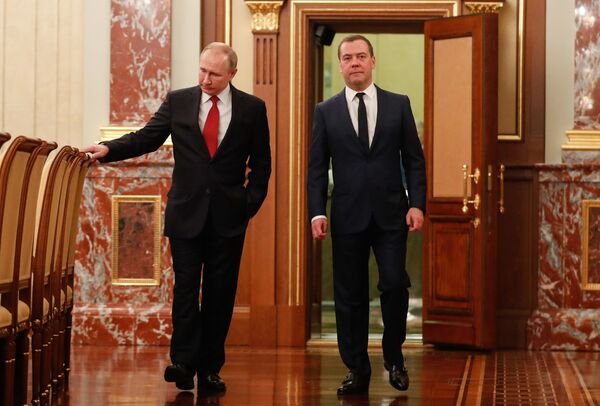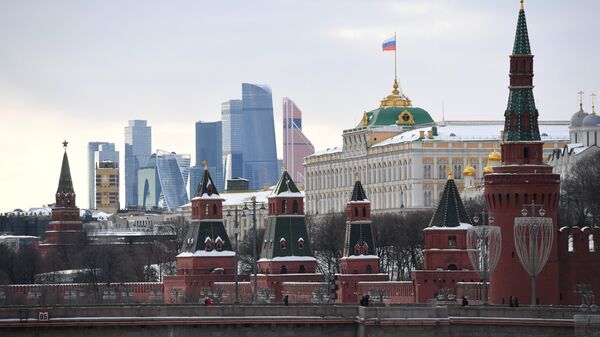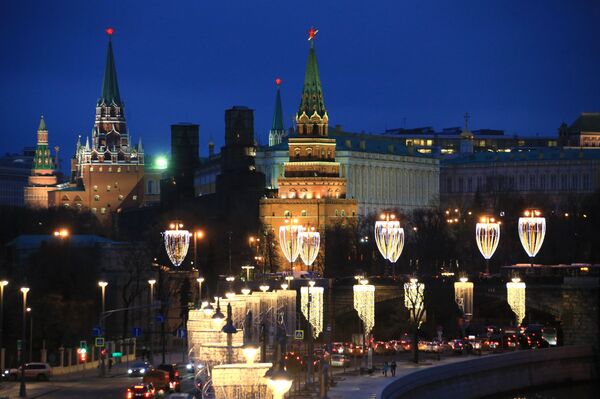In Wednesday's address, Putin proposed a number of major changes to the Russian constitution, including limits to the president’s powers of appointment, and the supremacy of Russian laws over international laws in instances where they may clash.
The Medvedev government’s resignation is logical in light of the ‘major shift’ in Russia’s political system outlined by President Putin during today's address, Oleg Morozov, a member of the Russian Senate’s Committee on Foreign Affairs, has said.
“Everyone heard Putin’s address, and the news of the government’s resignation is something akin to a bombshell. Although when Putin expressed these revolutionary proposals regarding changes to our political system, this decision had an explanation,” the senator noted.
According to Morozov, with the Medvedev government’s departure, some of the proposals outlined by the president at Wednesday’s address can be tested out before constitutional changes are implemented.
Morozov emphasized that Medvedev’s resignation was not in any way related to the quality of his work or his personal nature, but strictly to the upcoming proposed political changes.

Vladimir Dzhabarov, first deputy head of the Senate Committee on International Affairs, characterised Medvedev’s new role as deputy chief of Russia’s powerful Security Council as ‘vice president’ responsible for security and defence.
“The position carries a very high level of responsibility, and is worthy of Dmitry Medvedev, who has served as president, and for eight years as prime minister. In essence, [his new role will be that of] vice-president responsible for defence and security,” Dzhabarov said.
In any event, the lawmaker emphasised that “Putin is a serious and systematic person. He never does anything for no reason. This decision was planned.”
Analysts Divided on Significance of Changes
Maxim Shevchenko, an opposition politician, journalist and activist, does not believe that the resignation will bring any significant changes, likening it to a ‘plastic surgery’ with three distinct goals.
“First, this means a shift in emphasis among those forces which seek to become the ruling forces in Russia. Secondly, this is the start of the political campaign ahead of the 2021 elections, where the leader of United Russia, an unpopular politician, is removed from the public space and pushed into the role of deputy head of the Security Council, where no one will see him and, perhaps, soon forget about him. Third, this is not yet a real resignation, because I’m certain that most of the government will remain in place,” Shevchenko suggested.
Leonid Krutakov, a political analyst and associate professor at Russia’s Financial University, stressed that Putin’s constitutional proposals and the government’s resignation were no mere ‘technical detail’, but significant events which can fundamentally alter Russia’s political landscape.
“This is not just a desire to whip the old machine into shape, but a change of format. We are changing our goals and changing the team that will fulfil them. Of course, it’s necessary to look at the composition of the next government. If it consists of the same old faces or the ‘brilliant faces’ of the old people, nothing will change; the demand for new formats for solving problems, for new faces, is very high. I believe that there will be a real change of format. Of course, this will raise the significance of the president’s address to a new level, to a real political move,” Krutakov said.
On Wednesday, Mikhail Mishustin accepted President Putin’s nomination for the premiership. Before his nomination, Mishustin served as Russia’s Federal Tax Service since 2010. Mishustin’s candidacy now awaits the approval of Russia’s parliament, which will discuss it on Thursday.


